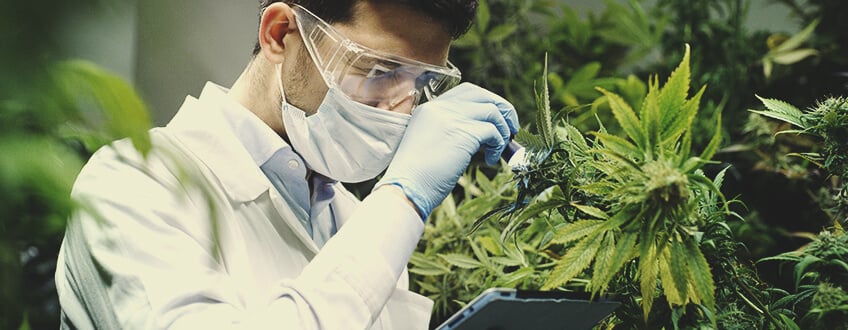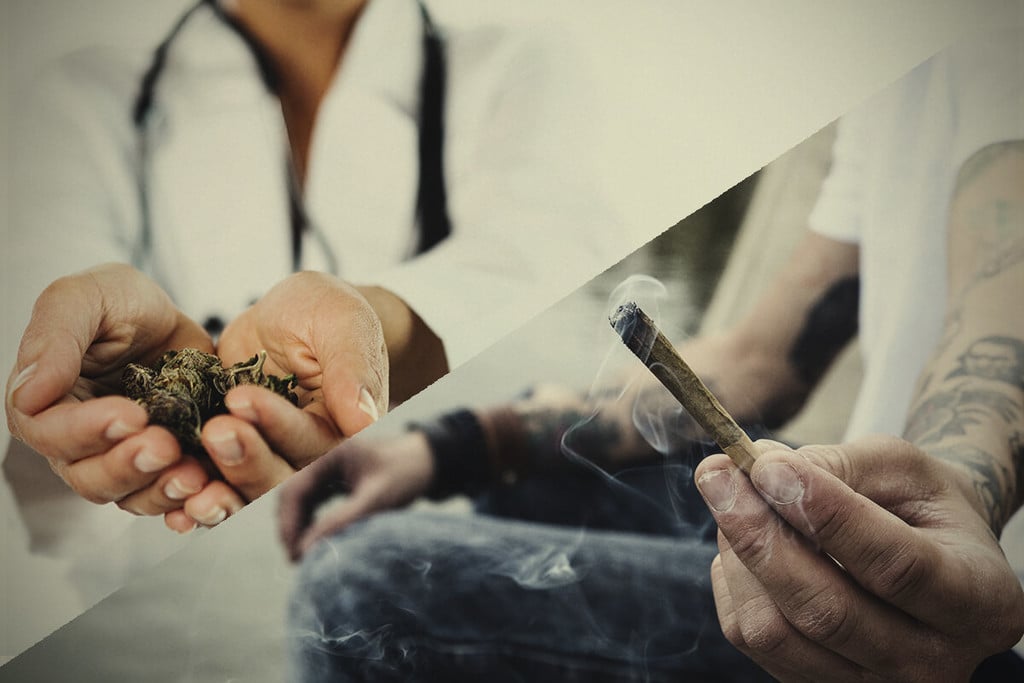.

Why Is There Social Stigma Surrounding Medical Cannabis?
Even if people are lucky enough to live in a country where they have access to medicinal cannabis products, they may still face significant social stigma surrounding these treatments. But how did such powerful anti-cannabis sentiment arise? Has it been with us always, or is it a relatively recent development?
Contents:
Cannabis legislation in the West is undeniably slackening, especially regarding medical use. Nevertheless, social marijuana stigma still remains, even toward medical marijuana users. And for the time being, this stigma is still strong.
But where does it come from, why does it persist, and on what (if any) evidence is it based?
Where Does Cannabis Stigma Come From?
It can sometimes feel as though cannabis has been detested for all of time, and that only now is public attitude shifting. That is, however, far from the truth. Cannabis has been loved by pretty much every culture it’s come into contact with over the last few thousand years.
The earliest use of cannabis can be traced back to India or China, where it is thought to have played a significant role in their ancient cultures. Indeed, in northern India, ceremonial cannabis use is still a commonly practised religious act.
Even in places where cannabis is illegal, including those countries that have extraordinarily harsh penalties against it, the herb is still used very regularly, if illicitly.
So, given how well-loved a plant it really is, why do some people hate it so much?
The Beginning of Anti-Cannabis Legislation
More or less, the foundation for all anti-drug legislation in the world was the 1925 International Opium Convention of the League of Nations. The aim of this was mostly to curb opium/heroin and cocaine abuse, which was widespread as they were not controlled substances. However, cannabis became lumped in with them.
Following that event, global attitudes toward cannabis rapidly soured, with most commentators seeing the US as leading the way in prohibition. In the US, attitudes toward cannabis began to change around 1900. Prior to this, cannabis/hemp had been one of their most well-loved crops.
From this point, the American media began to demonise and stigmatise cannabis use, attributing violence, crime, and sexual depravity to its use. This old marijuana propaganda morphed into many of the negative and damaging marijuana stereotypes we still see today.
Surprisingly, California was actually the first state to legally ban cannabis, in 1913. Many states and cities followed suit. After this, during the Great Depression of the 1930s, Harry J Anslinger, the first commissioner of the Federal Bureau of Narcotics (FBN), attempted to shift some of blame for the country’s collapse onto “Negroes, Hispanics, Filipinos, and entertainers”, citing cannabis use as the cause of “their satanic music, jazz, and swing” and claiming that “marijuana causes white women to seek sexual relations with Negroes, entertainers, and any others”.
Then, in 1996, the first state to prohibit cannabis use—California—legalized its use for chronic medical cases. The fight for medical marijuana was on. The reversal had finally begun, and since then, cannabis prohibition has been dropping away across the Western world.

Understanding Stigma
Stigma is a complex concept that involves relationships between individuals; individuals and the state; individuals and culture; and individuals and their own communities (such as religious groups).
Stigma is not a single, binaristic issue that is either present or not present. There are claims that stigma around cannabis has dissipated, and that it has become normalised[1]. However, critics say that these claims are over-simplified generalisations taken from smaller sub-groups of society in which cannabis use has indeed become ingrained and accepted.
For instance, though younger members of the population may have accepted recreational or medical cannabis use as a normal part of everyday life, that does not mean the whole of society has.
Stigma is loosely defined[2] as a “part of the self that is socially devalued to a point where it is seen as morally offensive”. Normalisation is essentially the negation of this, though not the opposite. For something to be normalised does not mean it becomes morally valued and virtuous, merely that it is accepted without moral judgement.
Stigma can appear in multiple forms. On the whole, there are social and institutional stigmas.
Social stigmas are matters of culturally understood moral judgement shared between groups of people. Institutional stigmas are those enacted by the state, such as anti-drug policy and the criminalisation of drug users.
Now, it is unusual for these to exist independently, at least for long. So long as the law prohibits a behaviour, except in extraordinary circumstances, there will be large sections of society who agree with it, turning an institutional stigma into a social one. Then, these social stigmas can uphold institutional stigmas, as taking a hard line on stigmas is a good way to win votes. Moreover, media bodies tend to proliferate such views.
Likewise, individual stigmas do not exist in a world of their own. Unrelated stigmas and prejudices can compound to create a sum potentially greater than their parts. For instance, cannabis stigma and racial stigma. Those belonging to a race that is subject to social or institutional prejudices are far more likely to be the victims of the amplified effects of cannabis stigma compared to others.
In terms of medical use, we can see how social stigmas linger beyond institutional stigmas. In countries where laws have changed to allow for the medical use of cannabis products, medical users still find themselves the victims of lasting social stigma.
But there's a bright side too. As medical cannabis use becomes more normalised within certain pockets of society, the general attitude is likely to soften as well. This, coupled with the increasing mass of research supporting the medical potential of cannabis, should, in time, reduce institutional stigmas against medical cannabis use.

How Does Stigma Affect the Medical Cannabis User?
Despite the huge reversal in attitudes toward medical cannabis, its use is still met with significant opposition. Cannabis stigma is rife, even with increasing evidence demonstrating its efficacy in many regards. Even in countries where medicinal cannabis is legal, often its prescription is rare and highly controlled.
And even when medical marijuana users are able to legally access cannabis as a treatment, they may still come up against a strong cultural resistance to their use. The stigmatisation of cannabis runs deep, making it almost impossible for some to believe in its medical efficacy.
Medical cannabis users come up against many issues, such as:
- Who should I trust?
- How do I purchase medical marijuana?
- Do I grow it?
- Am I justified in committing a potentially criminal act?
- Can a joint or bong really be medicinal?
Media Proliferation of Cannabis Stigma
Even now we find bizarre headlines such as “...first Briton known to have caught Covid died after taking Ecstasy, cannabis and pills and sharing bottle of Jack Daniel's...”, which seems to implicate cannabis in the COVID-19 pandemic. More so, the mention of “ecstasy” and “pills” as though they are two separate things signals either authorial ignorance or deliberate deception. Coupled with the generally poor sentence structure, we must ask ourselves, are these headlines espousing the whole truth?
Other unhelpful headlines, such as “Legalising cannabis would result in soaring numbers of people suffering from schizophrenia-like psychosis, one of Britain's top psychiatrists has warned” and such witticisms as “The deadly truth about why Mayor of London's plan to legalise cannabis is his dopiest idea yet” continue to fuel the cultural stigma against cannabis use.
Turning Patients Into Criminals
The consequences of this continued stigma are more severe than simply not being able to access the highest-quality bud in the shop. At its most perverse, it means legitimate medical users who feel cannabis is an effective medical treatment are denied legal, safe access to this drug, and instead need to purchase or grow it illegally.
So, depending on where someone lives, not only must they deal with their condition, but they may risk legal repercussions based on archaic prejudices.
Growing or purchasing cannabis under the radar will be easier for some than others. If users have family and friends who are accepting and supportive of such practices, things may not be so bad. However, for those whose acquaintances believe that cannabis is indeed the devil’s lettuce, an already isolating condition could become even more so, risking relationships and creating the need for developing what is essentially a secretive drug habit.

The Counterargument: Is Cannabis Really Risk-Free?
Of course, there are legitimate concerns surrounding the legalization of cannabis, even if they are often amplified beyond all recognition.
Though the most compelling arguments behind legalization focus on cannabis' medical implications, so too do those pushing for greater controls. There are many studies investigating cannabis’ potential medical benefits[3], but likewise it seems that cannabis can have detrimental health effects too. In young people predisposed to schizophrenia, cannabis use appears to increase the likelihood of psychosis[4]. Likewise, thinning of the frontal lobes[5] is evident in chronic users.
So, clearly, telling everyone to take as much cannabis as they want would not be an appropriate move. Nonetheless, are these negative effects enough reason to deny patients access to a potential treatment?
Medical Marijuana Use in the Modern Day: How Is It Changing?
It’s nice to believe that, in the end, the truth will win out. Despite great pockets of resistance still remaining, the general consensus seems to be shifting toward one of cannabis actually probably being okay, and not an evil plant with roots sucking up the nutrients of hell and encouraging depraved orgies between, God forbid, those of different races.
Evidence has been mounting for some time now in favour of cannabis’ potential medical applications. In the US, many states have legalized cannabis for medical and recreational use. Canada has totally legalized its use, as has Uruguay. In Europe, recreational use in Spain, Portugal, and the Netherlands has been decriminalised. And medical use is now legal in some capacity in many European countries too (although this can refer to CBD-exclusive varieties in some cases).
Moreover, cannabis plants classified as “hemp”—those with less than 0.3% THC by US federal law and 0.2% THC by EU law—are widely available across the Western world, causing a huge boom in the use of other cannabinoids, such as CBD.
So even if full-scale legalization may be a long way off for some countries, cannabis is more available now than it has been for a very long time.
Money talks, and if anything gets the wheels of governments moving, it is the promise of more money. Investment in the cannabis industry has never been higher. London, for instance, is currently pulling in the most cannabis-related capital in Europe, despite THC-rich cannabis still being illegal in the UK. If big business starts calling for relaxed cannabis legislation, it’s probable that governments may suddenly soften their attitudes.

Responsible Medical Cannabis Use
For those who wish to use cannabis as a potential treatment, it is important to do so in a safe, responsible way—like any drug. For those lucky enough to have a choice over the product they use, those with a 1:1 ratio of THC to CBD are likely to exhibit the most balanced effects, with CBD being shown to mitigate[6] some of the negative effects associated with THC.
Although cannabis is most associated with spliffs, joints, and bongs, smoking is not the only way to take it. Indeed, if you’re using cannabis to benefit your health, it’s likely you don’t want to be breathing in combusted materials. So, if you’re able, making edibles or extractions/tinctures may be a viable way to take cannabis without the ill effects of smoking, which exist even if you don’t use tobacco.
In terms of dosage, start small. Some cannabis strains/products are much stronger than others, so if you have a low tolerance, pace yourself and see how you get on. Even if high doses aren’t necessarily dangerous, stomach discomfort and general unease are common side effects of overdoing it—and these are probably counterproductive!
Shedding the Medical Cannabis Stigma: What the Future Holds
Though there are many issues in the world today, it seems fair to say that we also live in an age where at least some people recognise the rights of the individual. Indeed, Western culture is built upon the concept of the rights of the individual, the agency of the individual, and the responsibility of the individual over themselves.
Even if these concepts are somewhat naive, we have to ask ourselves, does outlawing a generally safe plant with medical potential really fit in with these ideals? Should the individual not be able to decide for themselves whether to try cannabis as a potential treatment for their condition without the risk of hefty prison sentences or judgement from society?
Given the supposedly liberal societies in which we live, does prohibition not seem a little baseless and bizarre?
- SAGE Journals: Your gateway to world-class journal research https://journals.sagepub.com
- A qualitative review of cannabis stigmas at the twilight of prohibition https://www.ncbi.nlm.nih.gov
- Therapeutic Effects of Cannabis and Cannabinoids - The Health Effects of Cannabis and Cannabinoids - NCBI Bookshelf https://www.ncbi.nlm.nih.gov
- Cannabis use and the risk of developing a psychotic disorder https://www.ncbi.nlm.nih.gov
- Long-Term Effects of Cannabis on Brain Structure https://www.ncbi.nlm.nih.gov
- A systematic review of the antipsychotic properties of cannabidiol in humans - PubMed https://pubmed.ncbi.nlm.nih.gov






































